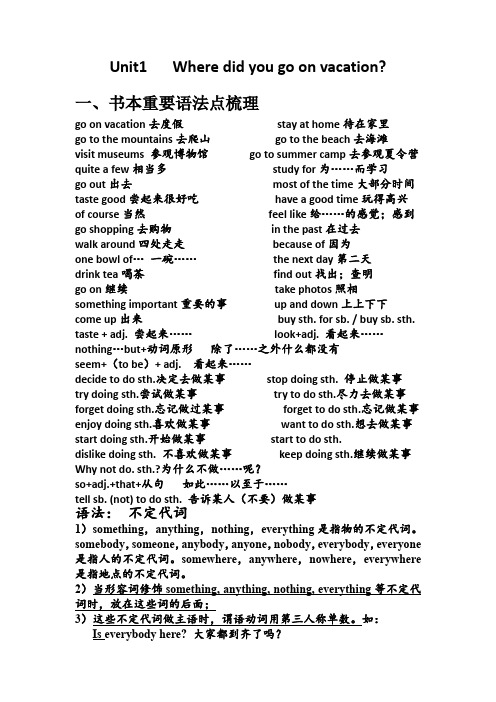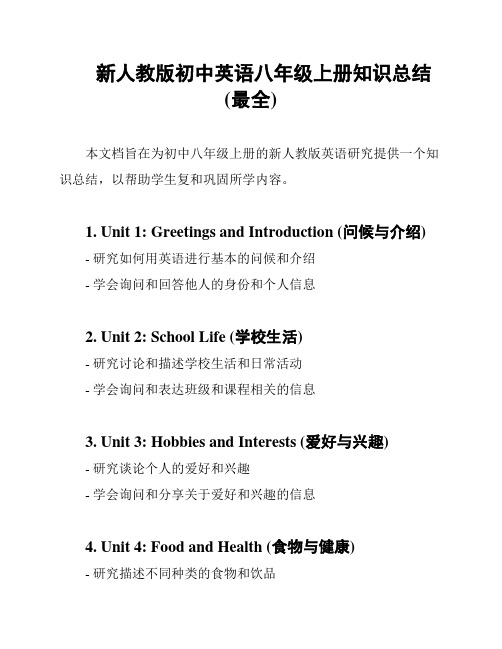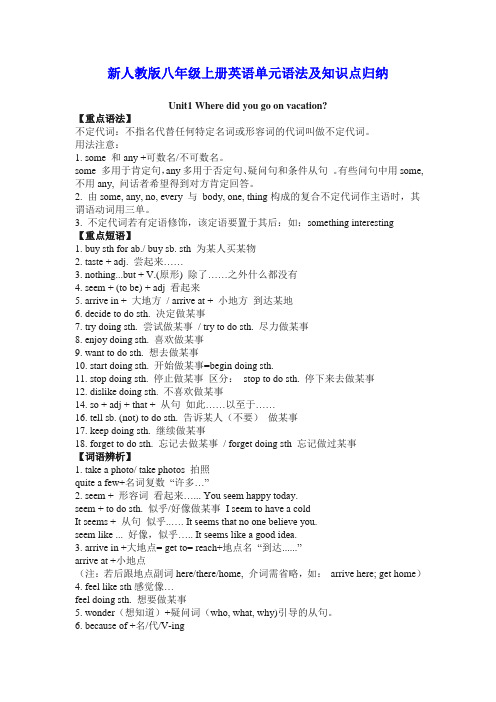新人教版八年级上册英语单元语法及知识点归纳
人教版英语八年级上册知识点、语法和作文总结

八年级上册英语知识点Unit1 Where did you go on vacation?一、短语stay at home 待在家里 go on vacation 去度假 go to the mountains 去爬山 go to the beach 去海滩 visit museums 参观博物馆 quite a few 相当多 go to summer camp 去参观夏令营study for 为……而学习 go out 出去 most of the time 大部分时间taste good 尝起来很好吃 of course 当然 have a good time 玩得高兴go shopping 去购物 feel like 给…的感觉;感受到 in the past 在过去walk aroundone bowl of… a bag of apples drink tea 喝茶 take photos 二、习惯用法 taste + adj. nothing…but+arrive in+大地点 / arrive at+小地点到达某地decide to do sth. 决定去做某事 try doing sth.尝试做某事 try to do sth.尽力去做某事forget doing sth.忘记做过某事/ forget to do sth.忘记做某事 enjoy doing sth.喜欢做某事want to do sth.想去做某事 start doing sth.开始做某事 stop doing sth. 停止做某事dislike doing sth. 不喜欢做某事 keep doing sth.继续做某事 Why not do sth.? 为什么不做……呢?so+adj.+that+从句如此……以至于…… tell sb. (not) to do sth. 告诉某人(不要)做某事三、词语辨析:1. anywhere 与 somewhere 两者都是不定副词。
人教版八年级上册英语语法、短语和知识点总结归纳

人教版八年级上册英语语法、短语和知识点总结归纳一、语法1. 一般现在时- 用法:表示经常性或惯性的动作或状态。
- 结构:主语 + 动词原形 (+ 其他成分)- 示例:I play soccer every weekend.2. 一般过去时- 用法:表示过去某个时间点或一段时间内发生的动作或存在的状态。
- 结构:主语 + 动词过去式 (+ 其他成分)- 示例:She watched a movie last night.3. 现在进行时- 用法:表示现在正在发生的动作。
- 结构:主语 + am/is/are + 动词-ing (+ 其他成分)- 示例:They are studying for the exam.4. 现在完成时- 用法:表示动作或状态发生在过去某个时间点,但与现在有关。
- 结构:主语 + have/has + 动词过去分词 (+ 其他成分)- 示例:I have finished my homework.5. 情态动词- 用法:表示能力、意愿、可能性等。
- 常见的情态动词有 can, could, may, might, must, should, ought to 等。
- 示例:He should go to bed early.二、短语1. as well as- 用法:表示两个事物同时存在或发生。
- 示例:She can speak English as well as Chinese.2. in order to- 用法:为了做某事。
- 示例:They woke up early in order to catch the train.3. by the way- 用法:用于引入一个新的话题或问题。
- 示例:By the way, have you seen the latest movie?三、知识点1. 直接引语和间接引语- 直接引语:用引号括起来的原话。
- 间接引语:将直接引语转述为陈述句或疑问句。
人教版八年级英语上册第一单元知识点归纳

Unit1 Where did you go on vacation?一、书本重要语法点梳理go on vacation去度假stay at home待在家里go to the mountains去爬山go to the beach去海滩visit museums 参观博物馆go to summer camp去参观夏令营quite a few相当多study for为……而学习go out出去most of the time大部分时间taste good尝起来很好吃have a good time玩得高兴of course当然feel like给……的感觉;感到go shopping去购物in the past在过去walk around四处走走because of因为one bowl of…一碗……the next day第二天drink tea喝茶find out找出;查明go on继续take photos照相something important重要的事up and down上上下下come up出来buy sth. for sb. / buy sb. sth. taste + adj. 尝起来……look+adj. 看起来……nothing…but+动词原形除了……之外什么都没有seem+(to be)+ adj. 看起来……decide to do sth.决定去做某事stop doing sth. 停止做某事try doing sth.尝试做某事try to do sth.尽力去做某事forget doing sth.忘记做过某事forget to do sth.忘记做某事enjoy doing sth.喜欢做某事want to do sth.想去做某事start doing sth.开始做某事start to do sth.dislike doing sth. 不喜欢做某事keep doing sth.继续做某事Why not do. sth.?为什么不做……呢?so+adj.+that+从句如此……以至于……tell sb. (not) to do sth. 告诉某人(不要)做某事语法:不定代词1)something,anything,nothing,everything是指物的不定代词。
人教版八年级英语核心语法考点归纳

人教版八年级英语核心语法考点归纳八年级上册Unit 1考点一:复合不定代词复合不定代词由some, any, no, every 与one, body, thing 构成。
在使用复合不定代词时应注意以下几点:1. some- 一般用于肯定句中,any- 一般用于否定句或疑问句中,在表示请求、建议或期望得到肯定回答时,常用some- 构成的复合不定代词;2. 复合不定代词作主语时按单数看待;3. 形容词或else 修饰复合不定代词的时候应后置。
考点二:一般过去时定义:一般过去时表示过去某个时间发生的动作或存在的状态,也可表示过去经常发生的习惯性的动作或行为。
结构:主语+ 动词过去式+ 其他;主语+was / were + 其他。
常用时见壮语:yesterday, two years ago, last week, just now 等。
1.The old man _____ in Shanghai, but he _____ in Haikou now.A.be born; liveB.was born ; liveC.is born; livesD.was born; lives2. —Where were you last Saturday?—I ____ in the Capital Museum.A. amB. will beC. wasD. have been八年级上册Unit 2考点一:拼读副词频度副词表示动作或行为发生的频率。
常见的频度副词及其发生的频率如下表:考点二:how 疑问词组练一练3.()do you usually go to school,Simon? -by bike.A.WhenB.HowC.WhatD.Where(答案在文末获取)八年级上册Unit 3考点一:形容词和副词的比较级形容词和副词的比较能表示两者之间的比较关系,表示A 比B 更……,通常用than 来连接。
初中英语人教版八年级上册重点短语+句型+常用语法汇总(1-5单元)

八年级英语上册重点知识汇总Unit 1 Where did you go on vacation?【本单元的话题】谈论假期活动内容,复习一般过去时。
【本单元的语法】1复习一般过去时;2.学习不定代词和不定副词的用法。
【不定代词和不定副词的用法】(1)左边的some、any、every、no与右边的body、one、thing构成不定代词,some、any、every、no 与右边的疑问副词where构成不定副词;(2)一般情况下以some开头的不定代词和不定副词用于肯定句,以any开头的不定代词和不定副词用于否定句、疑问句;以no开头的不定代词和不定副词表示否定含义(no one为两个单词);(3)不定代词或不定副词和形容词连用时,形容词放在后面。
He has something important to do.他有重要的事情要做。
(肯定句用something,形容词important放后)Did you buy anything special? (一般疑问句用anything,形容词special放后)Did you go anywhere interesting last month?上个月你去令人感兴趣的地方了吗?(一般疑问句用不定副词anywhere,形容词interesting放后)(4)不定代词和不定副词做主语时,后面的动词用单数形式。
Everone is here today.今天每个人都在这里。
【本单元的短语和知识点】1.go on vacation去度假go to the mountains 上山/进山2.stay at home呆在家go to the beach去海滩visit museums 参观博物馆go to summer camp去参观夏令营3.study for tests为考试而学习\备考go out出去4.quite a few相当多,不少(后跟可数名词复数)take photos照相most of the time大部分时间5.buy sth for sb = buy sb sth为某人买某物6.taste good.尝起来很好taste(尝起来)、look(看起来)、sound(听起来)为感官动词,后跟形容词7.have a good\great\fun time过得高兴,玩得愉快(=enjoy oneself)8.go shopping去购物9.nothing…but+动词原形:除了……之外什么都没有He had nothing to do at home but read yesterday.昨天他在家除了读书无事可做。
新人教版初中英语八年级上册知识总结(最全)

新人教版初中英语八年级上册知识总结(最全)本文档旨在为初中八年级上册的新人教版英语研究提供一个知识总结,以帮助学生复和巩固所学内容。
1. Unit 1: Greetings and Introduction (问候与介绍)- 研究如何用英语进行基本的问候和介绍- 学会询问和回答他人的身份和个人信息2. Unit 2: School Life (学校生活)- 研究讨论和描述学校生活和日常活动- 学会询问和表达班级和课程相关的信息3. Unit 3: Hobbies and Interests (爱好与兴趣)- 研究谈论个人的爱好和兴趣- 学会询问和分享关于爱好和兴趣的信息4. Unit 4: Food and Health (食物与健康)- 研究描述不同种类的食物和饮品- 学会提醒他人注意饮食健康和生活惯5. Unit 5: Festivals and Celebrations (节日与庆祝) - 研究讨论和描述各种节日和庆祝活动- 学会询问和分享关于节日和庆祝的信息6. Unit 6: Travel and Transportation (旅行与交通) - 研究谈论旅行和交通方式- 学会询问和表达关于旅行和交通的信息7. Unit 7: Daily Routines (日常作息)- 研究讨论和描述日常作息和活动安排- 学会询问和分享关于日常作息的信息8. Unit 8: Environmental Protection (环境保护)- 研究讨论和描述环境保护的重要性和方法- 学会提醒他人关于环境保护的意识和行动本文档总结了新人教版初中英语八年级上册所有单元的核心内容。
希望这个总结能帮助同学们回顾和巩固所学的知识,以便更好地应对考试和实际应用。
最全面新人教版八年级上册英语单元语法及知识点归纳汇总(精华版)

新人教版八年级上册英语单元语法及知识点归纳Unit1 Where did you go on vacation?【重点语法】不定代词:不指名代替任何特定名词或形容词的代词叫做不定代词。
用法注意:1. some 和any +可数名/不可数名。
some 多用于肯定句,any多用于否定句、疑问句和条件从句。
有些问句中用some,不用any, 问话者希望得到对方肯定回答。
2. 由some, any, no, every 与body, one, thing构成的复合不定代词作主语时,其谓语动词用三单。
3. 不定代词若有定语修饰,该定语要置于其后:如:something interesting【重点短语】1. buy sth for ab./ buy sb. sth 为某人买某物2. taste + adj. 尝起来……3. nothing...but + V.(原形) 除了……之外什么都没有4. seem + (to be) + adj 看起来5. arrive in + 大地方/ arrive at + 小地方到达某地6. decide to do sth. 决定做某事7. try doing sth. 尝试做某事/ try to do sth. 尽力做某事8. enjoy doing sth. 喜欢做某事9. want to do sth. 想去做某事10. start doing sth. 开始做某事=begin doing sth.11. stop doing sth. 停止做某事区分:stop to do sth. 停下来去做某事12. dislike doing sth. 不喜欢做某事14. so + adj + that + 从句如此……以至于……16. tell sb. (not) to do sth. 告诉某人(不要)做某事17. keep doing sth. 继续做某事18. forget to do sth. 忘记去做某事/ forget doing sth 忘记做过某事【词语辨析】1. take a photo/ take photos 拍照quite a few+名词复数“许多…”2. seem + 形容词看起来…... You seem happy today.seem + to do sth. 似乎/好像做某事I seem to have a coldIt seems + 从句似乎..…. It seems that no one believe you.seem like ... 好像,似乎….. It seems like a good idea.3. arrive in +大地点= get to= reach+地点名“到达......”arrive at +小地点(注:若后跟地点副词here/there/home, 介词需省略,如:arrive here; get home)4. feel like sth 感觉像…feel doing sth. 想要做某事5. wonder(想知道)+疑问词(who, what, why)引导的从句。
八年级上册英语单元语法及知识点归纳

新人教版八年级上册英语单元语法及知识点归纳Unit1 Where did you go on vacation?【重点语法】不定代词:不指名代替任何特定名词或形容词的代词叫做不定代词。
用法注意:1. some 和any +可数名/不可数名。
some 多用于肯定句,any多用于否定句、疑问句和条件从句。
有些问句中用some,不用any, 问话者希望得到对方肯定回答。
2. 由some, any, no, every 与body, one, thing构成的复合不定代词作主语时,其谓语动词用三单。
3. 不定代词若有定语修饰,该定语要置于其后:如:something interesting【重点短语】1. buy sth for ab./ buy sb. sth 为某人买某物2. taste + adj. 尝起来……3. nothing...but + V.(原形) 除了……之外什么都没有4. seem + (to be) + adj 看起来5. arrive in + 大地方/ arrive at + 小地方到达某地6. decide to do sth. 决定做某事7. try doing sth. 尝试做某事/ try to do sth. 尽力做某事8. enjoy doing sth. 喜欢做某事9. want to do sth. 想去做某事10. start doing sth. 开始做某事=begin doing sth.11. stop doing sth. 停止做某事区分:stop to do sth. 停下来去做某事12. dislike doing sth. 不喜欢做某事14. so + adj + that + 从句如此……以至于……16. tell sb. (not) to do sth. 告诉某人(不要)做某事17. keep doing sth. 继续做某事18. forget to do sth. 忘记去做某事/ forget doing sth 忘记做过某事【词语辨析】1. take a photo/ take photos 拍照quite a few+名词复数“许多…”2. seem + 形容词看起来…... You seem happy today.seem + to do sth. 似乎/好像做某事I seem to have a coldIt seems + 从句似乎..…. It seems that no one believe you.seem like ... 好像,似乎….. It seems like a good idea.3. arrive in +大地点= get to= reach+地点名“到达......”arrive at +小地点(注:若后跟地点副词here/there/home, 介词需省略,如:arrive here; get home)4. feel like sth 感觉像…feel doing sth. 想要做某事5. wonder(想知道)+疑问词(who, what, why)引导的从句。
- 1、下载文档前请自行甄别文档内容的完整性,平台不提供额外的编辑、内容补充、找答案等附加服务。
- 2、"仅部分预览"的文档,不可在线预览部分如存在完整性等问题,可反馈申请退款(可完整预览的文档不适用该条件!)。
- 3、如文档侵犯您的权益,请联系客服反馈,我们会尽快为您处理(人工客服工作时间:9:00-18:30)。
新人教版八年级上册英语单元语法及知识点归纳Unit1 Where did you go on vacation?【重点语法】不定代词:不指名代替任何特定名词或形容词的代词叫做不定代词。
用法注意:1. some 和any +可数名/不可数名。
some 多用于肯定句,any 多用于否定句、疑问句和条件从句。
有些问句中用some,不用any, 问话者希望得到对方肯定回答。
2. 由some, any, no, every与body, one, thing 构成的复合不定代词作主语时,其谓语动词用三单。
3. 不定代词若有定语修饰,该定语要置于其后:如:something interesting【重点短语】1. buy sth for ab./ buy sb. sth 为某人买某物2. taste + adj. 尝起来3. nothing...but + V.(原形) 除了之外什么都没有4. seem + (to be) + adj 看起来5. arrive in + 大地方/ arrive at + 小地方到达某地6. decide to do sth. 决定做某事7. try doing sth. 尝试做某事/ try to do sth. 尽力做某事8. enjoy doing sth. 喜欢做某事9. want to do sth. 想去做某事10. start doing sth. 开始做某事=begin doing sth.11. stop doing sth. 停止做某事区分:stop to do sth. 停下来去做某事12. dislike doing sth. 不喜欢做某事14. so + adj + that + 从句如此以至于16. tell sb. (not) to do sth. 告诉某人(不要)做某事17. keep doing sth. 继续做某事18. forget to do sth. 忘记去做某事/ forget doing sth 忘记做过某事【词语辨析】1. take a photo/ take photos拍照quite a few+名词复数“许多”2. seem + 形容词看起来... You seem happy today.seem + to do sth. 似乎/好像做某事I seem to have a coldIt seems + 从句似乎.. . It seems that no one believe you.seem like ... 好像,似乎.. It seems like a good idea.3. arrive in +大地点= get to= reach+地点名“到达...... ”arrive at +小地点(注:若后跟地点副词here/there/home, 介词需省略,如:arrive here; get home)4. feel like sth 感觉像feel doing sth. 想要做某事5. wonder(想知道)+疑问词(who, what, why)引导的从句。
6. because of +名/代/V-ingbecause+从句He can ’t take a walk because of the rain.I don ’t buy the shirt because it was too expensive.7. enough +名词足够的...形容词/副词+enoughUnit2 How often do you exercise?【重点语法】1.频率副词: always, usually, often, sometimes, never频率副词在句中通常放在实义动词之前, be 动词或助动词之后。
常用于一般现在时态中。
2.“次数”的表达方法一次once,两次twice,三次或三次以上:基数词+ times, 如:three times, five times, 3.how often 多“久一次”问频率,回答常含有频率词组或短语。
常见的how 疑问词:1)How soon 多久(以后)—How soon will he be back?他多久能回来?—He will be back in a month. 他一个月后能回来。
2)h ow long 多“久”—How long did it take you to clean the house?你打扫房子用了多久?—It took me half an hour to clean the house.我打扫这房子用了半小时。
3)How many+名复How much+不可名“多少”问数量(how much 还可问价格)【重点短语】1. go to the movies 去看电影2. look after = take care of 照顾3. surf the internet 上网4. healthy lifestyle 健康的生活方式5. go skate boarding 去划板6. keep healthy=stay healthy 保持健康7. eating habits 饮食习惯8. take more exercise做更多的运动9. the same as与什么相同10. be different from 不同11. once a month一月一次12. twice a week一周两次13. m ake a difference to 对有影响/作用14. most of the students=most students15. shop=go shopping=do some shopping购物16. be good for 对有益17. be bad for 对有害18. come home from school放学回家19. of course = certainly = sure 当然20. get good grades取得好成绩21. keep/be in good health 保持健康22. take a vacation 去度假【词语辨析】1. maybe / may bemaybe 是副词,意为“大概,可能,或许”,一般用于句首。
May be 是情态动词,意为“可能是...,也许是...,大概是... ”.The baby is crying. Maybe she is hungry.The woman may be a teacher.2. a few / few / a little / littlea few (少数的,几个,一些) a little ( 一点儿,少量) 表示肯定few (很少的,几乎没有的) little ( 很少的,几乎没有的) 表示否定修饰可数名词修饰不可数名词People can live to 100, but few people can live to 150.There is little time left. I wo n’t catch the first bus.Could you give me a little milk?3. hard / hardlyhard 作形容词,意为“困难的,艰苦的,硬的”;作副词,意为“努力地,猛烈地”。
hardly 为副词,意为“几乎不”。
The ground is too hard to dig.I can hardly understand them.It ’s raining hard. The people can hardly go outside.4. As for homework , most students do homework every day .as for...意思是“至于;关于”,+名词、代词或动词的-ing 形式(即动名词)。
如:As for him,I never want to see him here.至于他,我永远不希望在这里见到。
As for the story,you'd better not believe it.关于那故事,你最好不要相信。
5. That sounds interesting.这是“主语+系动词+表语”结构的简单句。
sound(听起来),look(看起来),smell(闻起来),taste(尝起来),feel(觉得),seem(好象),grow(变得),get(变得)等词在英语中可用作系动词,后跟形容词作表语。
如:It tastes good. 这味道好。
The music sounds very sweet.这音乐听起来很入耳。
The smoke grew heavier and heavier.烟雾变得越来越浓了。
6. percent 名词,意为“百分之”百分数的表示方法:基数+ percent (不用复数形式),percent做主语时,谓语动词的数要根据其后面的名词来确定。
50%:fifty percent 百分之五十Fifty percent of the apples are bad. 50%的苹果都坏了。
Twenty percent of the meat is in the fridge. 20%的肉都在冰箱7. not at a意l l 为“一点也不”,not 应放在be 动词、情态动词或助动词之后。
The story isn ’t interesti a n lg l. a那t 个故事一点也没有趣。
8. It is + adj. to do sth. 做某事是的。
It is interesting to play computer games. 玩电脑很有趣。
9. take, spend, payIt takes sb. some time to do sth.意为“花费某人时间来做某事”。
人(sb.) spend 时间/钱on sth. 买“某物花了钱”。
人(sb.) spend 时间/钱(in) doing 花“费多少时间来做某事”。
pay 的主语必须是人,而“花钱买某物”为pay...for...10. however 副词,意为“然而,可是”,表示转折关系,可放在句首、句中、句末。
Unit3 I ’m more outgoing than my sister.【重点语法】1. 形容词和副词的比较等级(1))形容词和副词的原形就是原级(2))比较级,表示较或更(3))最高级,表示最...。
2. 比较级句型:(1)A + be 动词+形容词的比较级+than +B “A比B 更”(注意:A 与B 必须是同级的,即必须是人与人,物与物进行对比)(2)“A+实意动词+副词比较级+ than + B 表”示“A比B ”(3)比较 A ,B 两人/ 两事物问其中哪一个较...时用句型:“Who/which +谓语动词+ adj./adv.比较级,A or B ? ”Who is thinner, Jenny or Mary?3. 比较级的特殊用法(1)“比较级+and+比较级”,意为“越来越”。
